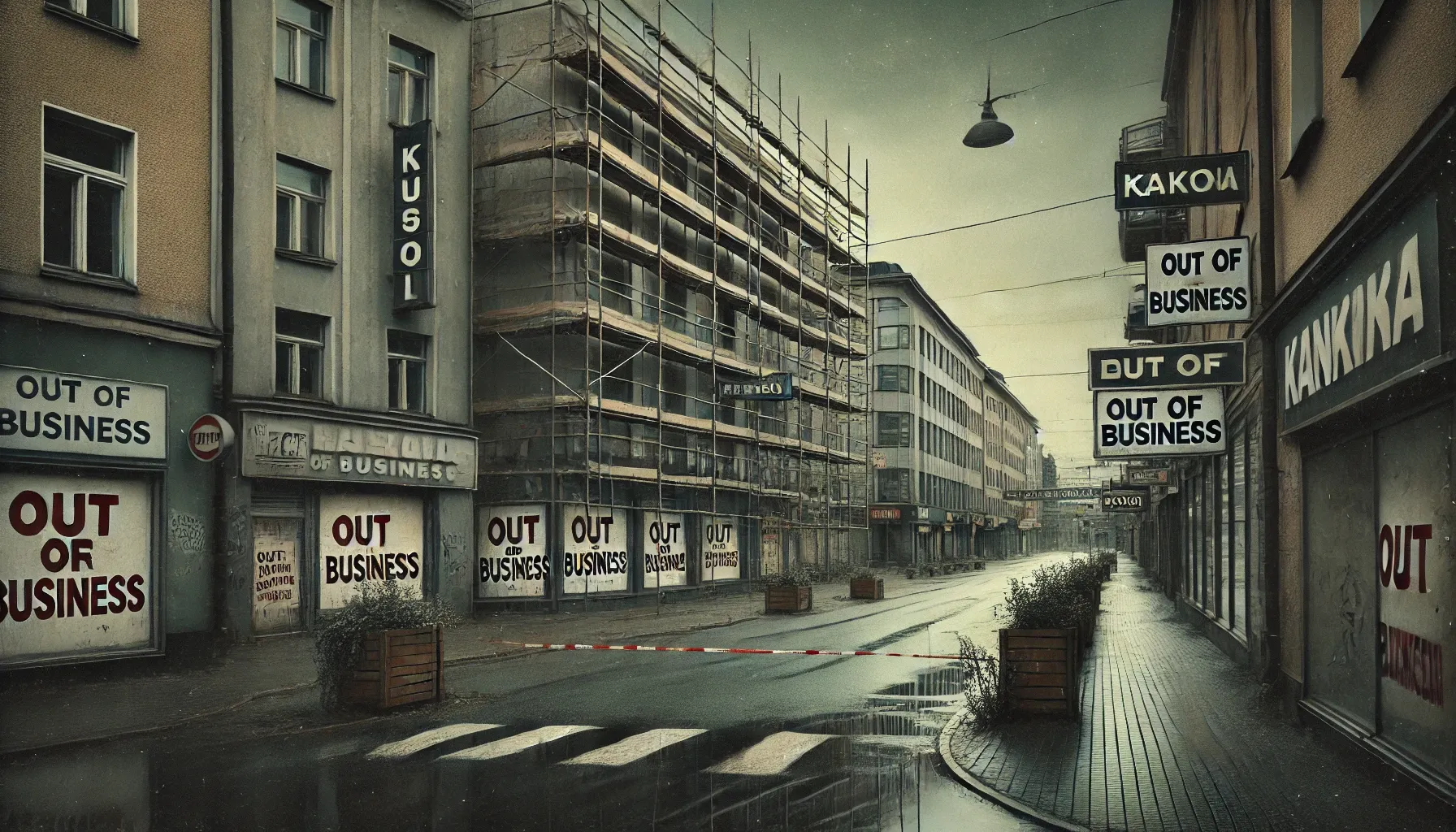What were the consequences of the bankruptcy of Lehto Group and the crisis in the construction industry in Finland?

- The collapse of Lehto Group: What caused the bankruptcy in Finland's construction industry?
- Why are prices for loans and housing rising in the Baltic and Scandinavian countries?
The Collapse of Lehto Group: Causes and Consequences
Several subsidiaries of the Finnish construction corporation Lehto Group, which is one of the key players in its industry, have announced their bankruptcy. This incident has dealt a serious blow to the construction sector in Finland and has sparked widespread public response. We reached out to an expert to find out what exactly led to the current crisis both in Finland and in the European new construction market as a whole.
Bankruptcy of subsidiaries
On February 6, 2024, companies such as Lehto Asunnot, Lehto Tilat, and Lehto Korjausrakentaminen announced their bankruptcy, which together cover the main areas of construction activity for Lehto Group. These enterprises accounted for a significant portion of the group's revenue. In 2022, the total revenue amounted to 345 million euros, but by the end of the first nine months of 2023, it had decreased to 154.5 million euros. Additionally, Lehto Group reported an operating loss of 23.4 million euros, which raises concerning prospects for its future.
Sharp decline in income
In 2018, Lehto's revenues exceeded 720 million euros, but since then there has been a sharp decline in performance. Following the bankruptcy announcement, trading of the company's shares was suspended on Nasdaq Helsinki. One of its subsidiaries has two unfinished sites in the cities of Oulu and Helsinki, but their future remains uncertain.
Wave of bankruptcies in Finland
It should be noted that in 2023, Finland faced an unprecedented surge in bankruptcies, the likes of which had not been seen in the last quarter-century, particularly in the construction sector. On August 28, 2023, Jukkatalo, a company that had been in operation for over half a century and was the second-largest construction firm in the country, also filed for bankruptcy. This fact came as a real shock, considering that the company had a solid portfolio of active orders. However, losses from unprofitable projects made the company's continued existence impossible. In 2022, Jukkatalo incurred losses of 4.6 million euros on a revenue of 95 million euros, which ultimately led to its closure.
Bankruptcy statistics
According to the publication Helsingin Sanomat, around 270 construction companies initiated bankruptcy proceedings in the first half of 2023. By the end of August, this number had increased to nearly 390. Amid the downturn in the Finnish construction market, workers from Estonia have started returning home, although the situation there also remains challenging. Estonian construction firms, like their Finnish counterparts, are showing a high level of bankruptcies.
Expert opinion on the market situation
The collapse of Lehto Group has become yet another confirmation of the deep crisis affecting the construction industry both in Finland and in neighboring countries. We also received the opinion of expert Roman Golubev, editor of the Latvian publication "Square Meter" and the portal varianti.lv. He noted: "I mainly specialize in the real estate market in Latvia, but I also keep an eye on what is happening in neighboring countries. I notice that the key trends and influencing factors in the industry are almost identical everywhere."
The future of the construction industry
The situation in the construction sector remains tense, and at this stage, it is extremely difficult to predict how soon the market will be able to recover. Many companies will have to reassess their business strategies and approaches to work in order to maintain competitiveness in the face of increasing economic instability. The further development of events will depend on a multitude of factors, such as:
- Availability of funding
- Level of demand
- The overall economic situation in the region
Increase in loan prices in the Baltic and Scandinavian countries
In recent months, there has been a noticeable increase in loan prices in the Baltic States and Northern Europe, which, in turn, has led to a decline in consumer spending interest among citizens.
Rising construction costs
It should also be noted that in 2022 there was a sharp increase in construction costs. Geopolitical conflicts disrupted traditional logistics chains, which, in turn, significantly raised the prices of construction materials and services. Despite construction companies in countries like Finland and Sweden actively pursuing new projects, public interest in purchasing real estate has significantly decreased. This is due to the rising cost of housing and the need to more carefully assess future mortgage expenses.
Examples of changes in mortgage payments
For example, in Latvia, if previously a borrower with a 20-year loan of 80,000 euros made a monthly payment of about 450 euros, today that amount has risen to 600 euros or more, which is an increase of 25%. At the same time, the financial situation of many borrowers remained the same by the time this change occurred. In Finland, where possible loan payments used to be in the range of 1500–2000 euros, an increase of 700–1000 euros has become a serious problem – citizens' incomes have not kept pace with the rising payment obligations.
Housing prices in Finland
Real estate prices in Finland are among the highest in the European context. For example, the cost per square meter in the center of Helsinki can exceed the price of a similar meter in Riga by two to three times. While in Latvia the price for new housing ranges from 2000 to 3000 euros per square meter, in Finland this figure can rise to 6000–9000 euros or more. Under such circumstances, it becomes clear to many citizens that covering such mortgage payments is simply impossible.
Customer expectations
Nevertheless, many potential buyers in Finland, Estonia, and Sweden prefer to be patient and wait for a decrease in EURIBOR rates. These rates, at which banks in the European Union lend to each other, have been in negative territory for over eight years and are now hovering just below the 4% mark. Although at times they have even exceeded this level, many residents of the region still hope for more favorable lending conditions in the future.

Conclusion
The observed bankruptcy of companies like Lehto Group and other players in the construction sector in Finland raises serious questions about the future of this industry not only in this country but across Europe. As the author of this article, I see that the current crisis is deeper than just a series of individual challenges. Many factors, such as the sharp rise in interest rates and the need to increase housing prices, have contributed to the overall economic condition of the region.
Factors of the crisis
- Inflation:a rapid increase in prices, reaching 20% in the Baltic countries.
- Increase in the cost of construction materials:Disruptions in the usual logistics chains have increased the cost of construction.
- Decrease in demand:Customers have become more cautious, reassessing their financial capabilities.
- Return of interest rates:a sharp increase in mortgage rates, leading to higher monthly payments.
Market situation
Expanding on the example of Latvia and other Baltic countries, we can see that similar causes of the crisis also affect the local real estate market. As an economic expert, I am convinced that the inevitable fluctuations in the construction market are not just a physical phenomenon, but also a signal for companies to rethink their business models and adapt them to the new economic conditions.
Besides waiting for recoveries
It is important to note that construction companies must be prepared for changes and adaptive strategies that will help them survive in an unpredictable market. The expectation of lower interest rates offers hope, but it is also crucial for companies not to rely solely on this factor. They need to be active participants in the process, seeking new financing options and managing risks.
The future of the construction industry
Thus, the future of the construction industry in Finland and Europe depends on the willingness of companies to adapt to new conditions and leverage existing opportunities for sustainable growth. Notably, the changes happening today could serve as a starting point for a more sustainable and innovative approach to construction in the coming years. I believe that over time the market will recover, but it will change significantly, and those companies that can adapt will be the ones to benefit.
Comment
Popular Posts
9 October 2024
1862
9 October 2024
271
Popular Offers




Subscribe to the newsletter from Hatamatata.com!
Subscribe to the newsletter from Hatamatata.com!
I agree to the processing of personal data and confidentiality rules of Hatamatata




